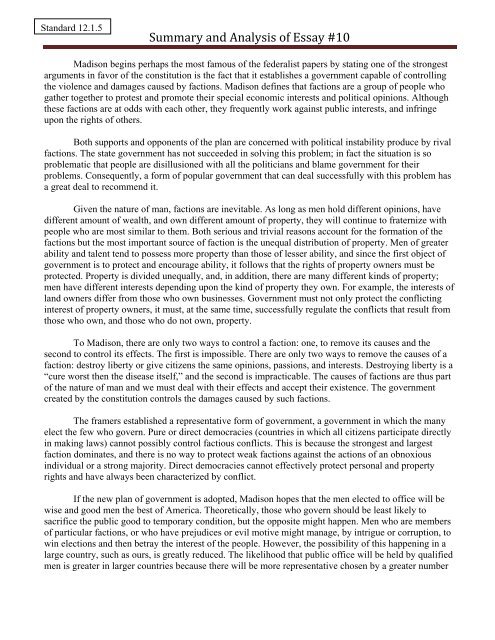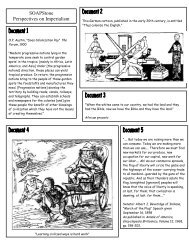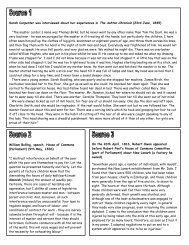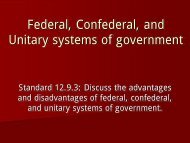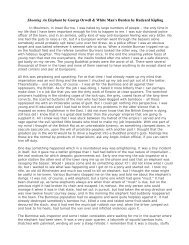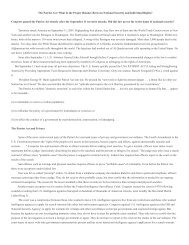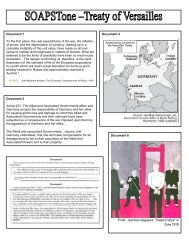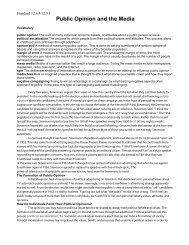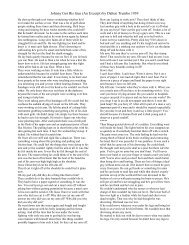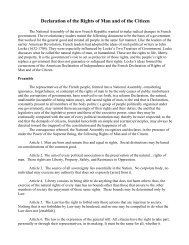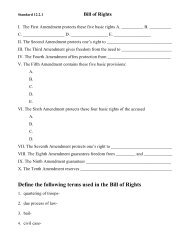Federalist Paper #10 Summary
Federalist Paper #10 Summary
Federalist Paper #10 Summary
You also want an ePaper? Increase the reach of your titles
YUMPU automatically turns print PDFs into web optimized ePapers that Google loves.
Standard 12.1.5<br />
<strong>Summary</strong> and Analysis of Essay <strong>#10</strong><br />
Madison begins perhaps the most famous of the federalist papers by stating one of the strongest<br />
arguments in favor of the constitution is the fact that it establishes a government capable of controlling<br />
the violence and damages caused by factions. Madison defines that factions are a group of people who<br />
gather together to protest and promote their special economic interests and political opinions. Although<br />
these factions are at odds with each other, they frequently work against public interests, and infringe<br />
upon the rights of others.<br />
Both supports and opponents of the plan are concerned with political instability produce by rival<br />
factions. The state government has not succeeded in solving this problem; in fact the situation is so<br />
problematic that people are disillusioned with all the politicians and blame government for their<br />
problems. Consequently, a form of popular government that can deal successfully with this problem has<br />
a great deal to recommend it.<br />
Given the nature of man, factions are inevitable. As long as men hold different opinions, have<br />
different amount of wealth, and own different amount of property, they will continue to fraternize with<br />
people who are most similar to them. Both serious and trivial reasons account for the formation of the<br />
factions but the most important source of faction is the unequal distribution of property. Men of greater<br />
ability and talent tend to possess more property than those of lesser ability, and since the first object of<br />
government is to protect and encourage ability, it follows that the rights of property owners must be<br />
protected. Property is divided unequally, and, in addition, there are many different kinds of property;<br />
men have different interests depending upon the kind of property they own. For example, the interests of<br />
land owners differ from those who own businesses. Government must not only protect the conflicting<br />
interest of property owners, it must, at the same time, successfully regulate the conflicts that result from<br />
those who own, and those who do not own, property.<br />
To Madison, there are only two ways to control a faction: one, to remove its causes and the<br />
second to control its effects. The first is impossible. There are only two ways to remove the causes of a<br />
faction: destroy liberty or give citizens the same opinions, passions, and interests. Destroying liberty is a<br />
“cure worst then the disease itself,” and the second is impracticable. The causes of factions are thus part<br />
of the nature of man and we must deal with their effects and accept their existence. The government<br />
created by the constitution controls the damages caused by such factions.<br />
The framers established a representative form of government, a government in which the many<br />
elect the few who govern. Pure or direct democracies (countries in which all citizens participate directly<br />
in making laws) cannot possibly control factious conflicts. This is because the strongest and largest<br />
faction dominates, and there is no way to protect weak factions against the actions of an obnoxious<br />
individual or a strong majority. Direct democracies cannot effectively protect personal and property<br />
rights and have always been characterized by conflict.<br />
If the new plan of government is adopted, Madison hopes that the men elected to office will be<br />
wise and good men the best of America. Theoretically, those who govern should be least likely to<br />
sacrifice the public good to temporary condition, but the opposite might happen. Men who are members<br />
of particular factions, or who have prejudices or evil motive might manage, by intrigue or corruption, to<br />
win elections and then betray the interest of the people. However, the possibility of this happening in a<br />
large country, such as ours, is greatly reduced. The likelihood that public office will be held by qualified<br />
men is greater in larger countries because there will be more representative chosen by a greater number
of citizens. This makes it more difficult for the candidates to deceive people. Representative government<br />
is needed in larger countries, not to protect the people from the tyranny of the few, but to guard against<br />
the rule of the mob.<br />
In large republics, factions will be numerous, but they will be weaker than in small, direct<br />
democracies where it is easier for factions to consolidate their strength. In this country, leaders of<br />
factions may be able to influence state governments to support unsound economic and political polices<br />
to promote, for example, specifically delegated to it; the states, far from being abolished, retain much of<br />
their sovereignty. If the framers had abolished the states governments, the opponents of the proposed<br />
government would have a legitimate objection.<br />
The immediate object of the constitution is to bring the present thirteen states into a secure<br />
union. Almost every state, old and new, will have one boundary next to territory owned by a foreign<br />
nation. The states farthest from the center of the country will be most endangered by these foreign<br />
countries; they may find it inconvenient to send representatives long distances to the capital, but in terms<br />
of safety and protection they stand to gain the most national government.<br />
Madison concludes that he presents the previous argument because he is confident that those<br />
who will not listen to those “prophets of gloom” who say that the proposed government are unworkable.<br />
For this founding father, it seems incredible that these gloomy voices suggest abandonment of the idea<br />
of coming together in strength the state still have common interest. Madison concludes that “according<br />
to the degree of pleasure and pride we feel in being Republicans, ought to be zeal in cherishing the spirit<br />
and supporting the character of <strong>Federalist</strong>.”


